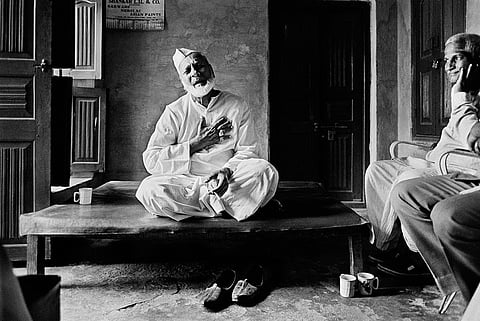
- HOMEGROWN WORLD
- #HGCREATORS
- #HGEXPLORE
- #HGVOICES
- #HGSHOP
- CAREERS
- ABOUT US
- CONTACT US

On 21st March 1916, a musical genius was born in the small village of Dumraon in Buxar, Bihar. He was initially known as Qamruddin Khan and later came to be known by the name that the world recognizes him by today, Ustad Bismillah Khan. He played the shehnai, a ceremonial oboelike North Indian horn with such expressive originality, that he became one of the most revered greats of Indian classical music. Today, we dig a little deeper into the life and legacy of the maestro.
He was born as the second son of Paigambar Khan and Mitthan. His father named him Qamaruddin so that his name would sound similar to his elder brother, Shamsuddin. However, when his grandfather, Rasool Baksh Khan held him as a baby, he uttered the word "Bismillah" and that was how he came to be known as Bismillah Khan.
Khan was born into a family of musicians and thus his exposure to Indian classical music started from a very young age. His ancestors were musicians in the court of the princely states of Bhojpur and his father was a shehnai player in the court of Maharaja Keshav Prasad Singh. Khan grew up watching his father play the shehnai and was inspired to follow in his footsteps.
Bismillah journeyed to Varanasi at the age of six where he got trained by his uncle, Ali Baksh 'Vilayatu'. His uncle used to play shehnai in temples, Hindu religious ceremonies, and weddings. Bismillah learned intuitively by accompanying his uncle and watching him play. As Bismillah’s love for the instrument grew, he practiced numerous musical forms and ragas that helped him discover a number of patterns in the shehnai that were previously considered impossible to play by other musicians.
Bismillah got his first major break in 1937 when he played at a concert at the All India Music Conference in Calcutta. It was a ground-breaking performance that completely changed the way people perceived shehnai. The shehnai’s popularity grew in unison with Bismillah and soon there was no turning back. He went on to perform in different countries such as the USA, Canada, Bangladesh, West Africa, Japan, Iran, Iraq, Hong Kong, and various parts of Europe. He has also played in many prestigious events across the world including the World Exposition in Montreal, the Cannes Art Festival, and the Osaka Trade Fair. The shehnai was once regarded as a mere folk instrument but thanks to Bismillah, it went on to be recognized as a vital Indian classical instrument. It not only attracted Asian music lovers but also made millions of westerners recognize and value the true potential of the shehnai.
Bismillah has lent his musical brilliance to the film scores of movies such as Goonj Uthi Shehnai, Sanaadi Appanna, and Sange Meel Se Mulaqat. He has received several national and international awards for his artistry and was bestowed the Bharat Ratna, the nation’s highest civilian award. But the greatest honor was when Bismillah Khan was asked to play shehnai at Red fort, Delhi on India’s Independence Day eve in 1947. His performance was considered the major attraction of the Independence Day celebrations and reached thousands of households as it was broadcasted live by Doordarshan.
On 21 August 2006, a national treasure was irretrievably lost. Bismillah Khan died of cardiac arrest. The Government of India declared a day of national mourning for his death. His body along with his beloved shehnai was buried at the Fatemaan burial ground of old Varanasi under a neem tree with a 21-gun salute from the Indian Army. To honor the maestro posthumously, Sangeet Natak Akademi came up with a new award called ‘Ustad Bismillah Khan Yuva Puraskar’ which is awarded to young artists who bring a fresh perspective to the field of music, dance, and theatre.
Bismillah had a life well lived but his fame never pulled him away him from his roots. He is known for living a simple and humble lifestyle. In many ways, he symbolizes everything that our ideal nation seeks to embody. He was a Shia Muslim, who worshipped the goddess Saraswati and performed at both Hindu and Muslim ceremonies. We often hear the words “unity in diversity”, and “secularism”, but Bismillah was someone who truly embodied them. He loved his instrument so much that he once referred to the shehnai as his wife. It is one thing to love your instrument but a whole different ball game to make millions of people fall in love with your instrument.
Listen to this recording of Ustad Bismillah Khan playing Raag Yaman, which is an evening raag best captured when played on the shehnai. Raag Yaman feels like the onset of the setting sun in the plateaus and encasulates but a small sliver of what makes the meastros music so otherworldly and beautiful.
